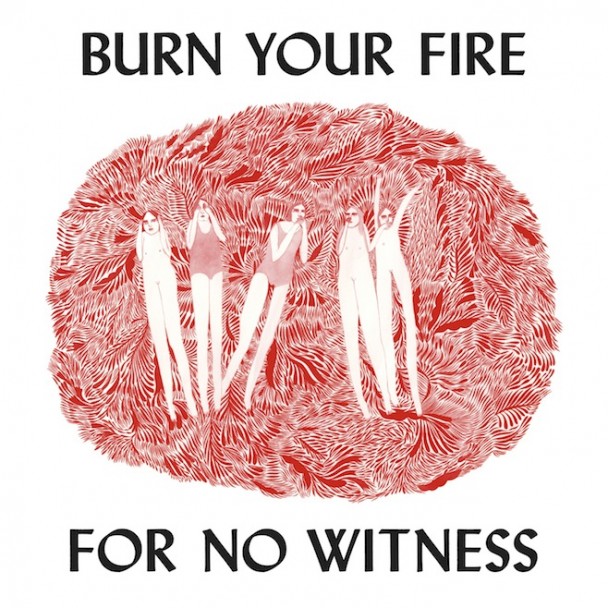Print Edition: February 19, 2014
Angel Olsen probably doesn’t need to be a great songwriter. No matter what the lyric, Olsen can shake several different meanings out in the space of a breath, her voice capable of ranging between a whisper and an echoing, room-hushing register climb with barely a rest. And yet with few exceptions, she does not waste words. Olsen reaches high in her serious treatment of well-travelled ground, but she’s curious and skeptical, not loud and self-satisfied with what she finds (“these thoughts are easy to think, easy to say”), romantic honesty tempered by humour (“if only we could understand each other, I’d happily die”). Both those quotes and all these qualities were evident on Half Way Home from two years ago, but Olsen has entered a major transition since then.
Olsen has contributed guest vocals, begun an especially rewarding video collaboration with director Zia Anger (from stark chiaroscuro to blown-out multi-strip 16mm), and signed with a larger label. In a more standard singer-songwriter vein, there were two significant sources of new material in between Half Way Home and her new album Burn Your Fire for No Witness. Her split EP Sleepwalker featured “California,” which could have comfortably fit in with Half Way Home’s tracklist, musing about “California, not literally,” and “Sweet Dreams” which, from its drumcount opening, announced the most significant aural change in Olsen’s new material. Coming a fair distance from what often sounded like no more than a room, a guitar, and a tape recorder, Olsen is accompanied on about half the songs on Burn Your Fire with a full band produced by John Congleton.
At her most striking, Olsen can command a song on vocal strength alone, but Burn Your Fire is Olsen working with a different kind of composition. Instead of doing all the work, drum builds (“High & Wild,” “Stars”) and filled electric outros (“Lights Out”) sometimes take over, making Olsen’s work slot more easily into a genre, but that doesn’t change is her creative approach — songs last only as long as they need to (varying from two minutes to seven), structures can work in favour or be abandoned as needed, and while her rhyme schemes still tend to be very simple, it’s with communication, not easy summations in mind that this is done.
Olsen’s other significant interstitial release was a duet with Marissa Nadler covering Mickey Newbury’s “Frisco Depot.” Newbury’s rain-pelted ballads are some of the most quiet and devastating to come out Nashville, and he’s one influence in Olsen’s more restrained portraits of departure and slow recovery. Burn Your Fire opens with a track titled “Unfucktheworld,” suggesting her hopeful, expansive point of view (other earlier examples include “Some Thing Cosmic” and “Creator, Destroyer”) while following a trajectory of alienation. “I quit my dreaming the moment that I found you,” and this, Olsen draws out, was injurious.
Most of Olsen’s writing comes across like the wisdom she would offer to a younger version of herself. “I’ve made up my mind / I’ve made up my mind / I’ve wasted my time / making up my mind,” is the circular salvo of “Forgiven/Forgotten,” a song that unleashes Olsen’s voice and newly aggressive guitar, backed by and filtered through her band, and idea-wise Olsen follows this with the album’s title statement on “White Fire” and the anti-utopic “Iota,” among other demonstrations. It is didactic, but only in the sense that Olsen is learning as she creates, and this is her keeping a record of where she is. “Lights Out” expands on a single line from Half Way Home’s “The Sky Opened Up,” reminding that “No one’s gonna hear it the same as it’s said / No one’s gonna listen to it straight from your head.” Between the two songs, and the two albums, her more recent version isn’t “better,” neither is it the same. Olsen’s updating a constant struggle between idealism and reality, which emerges in her frequent wishes (often answered with a criticism, though not an answer): “If only we got wiser with every breath / If only we could dance our way to death.” Olsen’s voice is capable of being morose, but also knows the heights of not dwelling there.
On Burn Your Fire, her blues are balanced partly by the piano hanging in the background of “High & Wild,” the drum patterns waiting to pick up “Window.” That last song suggests new directions, though it’s hard to say if that’s merely because it’s the album closer or because Olsen intends to continue to challenge what she already excels at in future albums. For now, there’s her sometimes wry, sometimes direct sensitivity, which most singers have, but few can pass on like she does in the post-chorus kick of “Hi-Five.”



